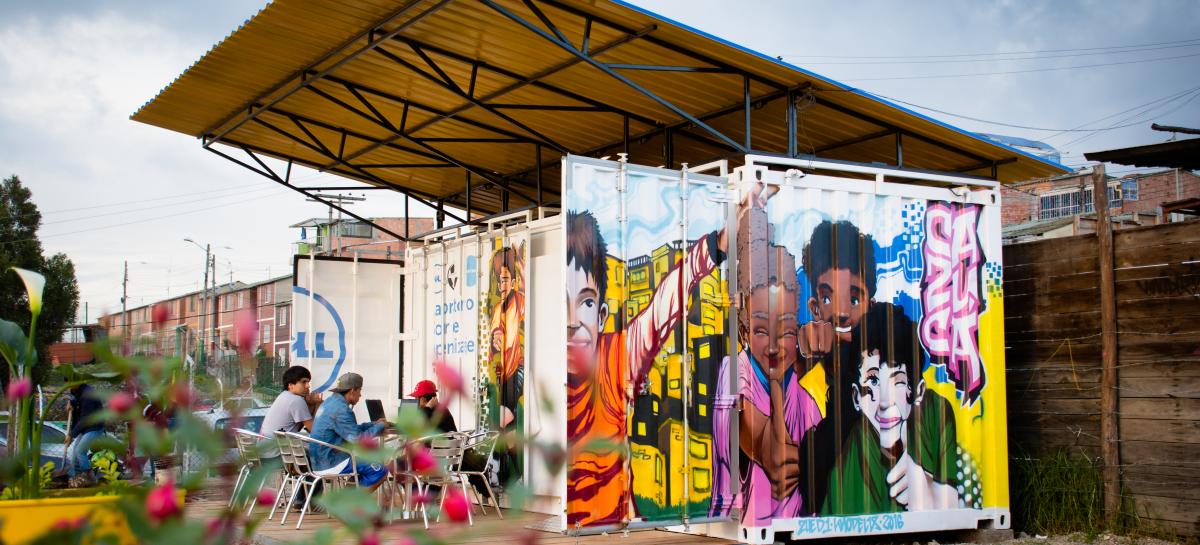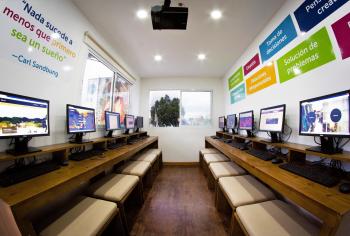Computer Aid International, in partnership with Dell, launched the Dell Solar Community Hub in Cazucá near the outskirts of Bogotá in the Summer of 2016.
The aim of this program is to build local institutional capacity to ignite aspiration-led learning for marginalised youth of Cazuca who came to the area to escape the violence caused by the armed conflict between illegally armed groups and the national army.
Regrettably, Cazucá has been living under a confinement and just recently started to wake up from it; we have been victims of all kinds of violence and nothing has ever happened. No one did much to change this reality apart from Tiempo de Juego. Since the Lab arrived, the younger generation has naturally been curious and excited, but the emotion that this event has stirred in the elders has been really special. The fact that someone has finally considered Cazucá a priority is not only important because of the technology and training provided, but also because of the optimism it inspires in the entire community.
William Jimenez, Regional Coordinator at Tiempo de Juego
The Solar Community Hub is part of a multi-country youth learning program, bringing together Dell technology and long-term engagement with Computer Aid’s ICT4D expertise. They provide a unique space for enriched learning and access to some of the best skills training, for traditionally underserved children and young adults. The program brings together expert in-country trainers, who can build local partners’ capacity to deliver 21st-century skills that are valuable to young people in the community.
Solar Community Hub Specific Objectives:
- To provide a unique, technology-rich and resource-rich learning space, that brings together high-quality training partners for the benefit of local educational institutions.
- Enable educators to provide valuable 21st-century digital-skills and ignite youth learning in ways that are most relevant to their beneficiaries’ aspirations to help them succeed in their local economy.
Even the architecture of the Solar Community Hub has been redesigned to create a more inclusive environment. “In 2015, we consulted London based architects Squire & Partners to rethink the model,” stated Keith Sonnet, Chief Executive at Computer Aid International, “The side opening doors and the outside deck creates more natural light and makes the Solar Learning Lab a natural gathering point for the community”.
Through the Solar Community Hub programs and quality of resources and learning they enable, we are motivating hundreds of young people around the world to develop transferable skills crucial to better life, school and work situations. The program works on a student-centric level to help each participant select skills that align with personal life goals and become positive leaders for change in their community.
This project contributes to the following Sustainable Development Goals (SDGs):
| Our work contributes directly to SDG 4 as students are gaining relevant technical skills that will improve their job prospects, contributing to Target 4.4. | |
| This project directly contributes to Target 5.B of SDG 5, since we are providing and promoting ICT access to male and female students at a youth centre in the outskirts of Bogotá. | |
| This project contributes to Target 8.6 of SDG 8, since students at the youth centre are increasing their job prospects and reducing the likelihood of unemployment after graduating. | |
|
By providing the youth centre with computer labs, allowing thousands of beneficiaries(during the lifetime of equipment) to access information and communications technology, we are directly contributing to Target 9.C of SDG 9. |
In partnership with



